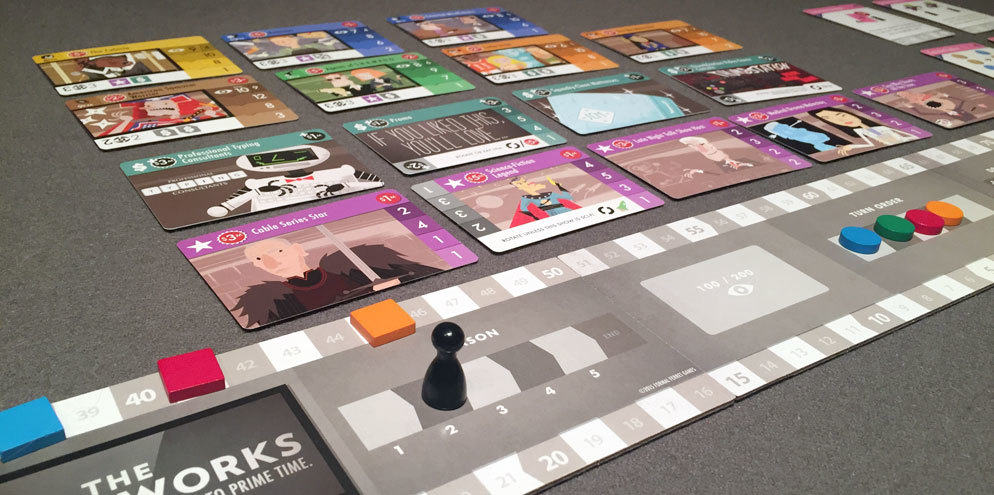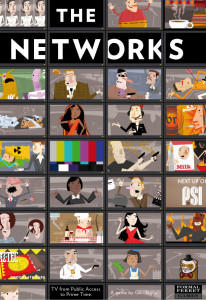 One of the coolest aspects of being involved with a board gaming website is the opportunity to see a game evolve from pre-release to its final form.
One of the coolest aspects of being involved with a board gaming website is the opportunity to see a game evolve from pre-release to its final form.
Back in August 2015, I previewed The Networks. I found the game very enjoyable, but, being pre-release, I wondered what would change when the final product was released. There was very little card art, placeholder mini porker chip tokens, and the potential for rule changes and/or tweaking.
Well, slightly more than one year later I have the final copy in my hands. I was supposed to pick the game up from Gil Hova, the game’s designer, at Gen Con 2016 but he had sold out due to demand far exceeding even his most optimistic estimates. So were those that were lucky enough to get a copy of the game going to regret their newest game acquisition or do I think that they were very happy the purchased The Networks?
Game Overview:
The Networks is card drafting game for one to five players who take on the role of TV executives attempting to build their fledgling networks from “Public Access to Prime Time” over five seasons (rounds). The TV executive with the most viewers (points) after five seasons is declared the winner.
Games can be played between 60-90 minutes, depending on the number of players and how quickly they play.
Game Components:
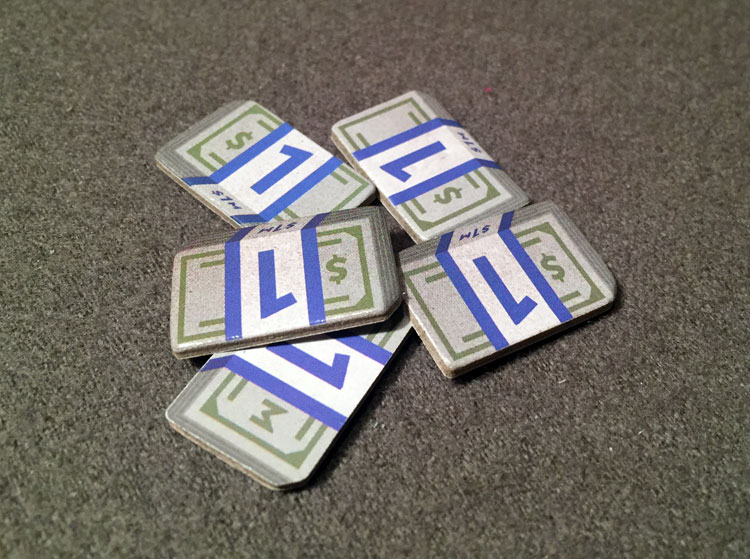
The components for The Networks were good.
I liked:
- Cards – the cards are great, with one minor exception (see below). They are easy to understand, laid out well, funny (I am talking some literal LOL moments) and the card art is phenomenal. I absolutely love the final presentation of these cards. Having great cards is really important in a card drafting game as they are the focal point of the game.
- The Player Boards – these were laid out very well – it provides spaces for your three active shows, the green room, reruns, and your archives. It also lists all of the actions available on a turn and other useful information.
- Money Chips – no paper money here. Just nice, thick cardboard chits.
I did not like:
- Minor Printing Issues – I did not find any gameplay breaking printing issues; however, there were some color issues in my copy. The Ad cards had slightly different shades of green. It is not significant enough that I would consider the cards marked, but it will be noticeable, especially to those that look for these type of inconsistencies. The Network cards, which are pink, have the same issue, but it is even less noticeable than the Ad cards.
There appear to be white/gray coloration issues with the player boards and the face up sides of the Network cards. I say appears because it looked like printing errors to me; however, my wife insists it is background static like snow on a TV. Her rods and cones are younger, so she is probably correct.
How to Play:
Below is a high level summary of the game; however, you can download a pdf of the official rules here.
At the start of each season, a different number of TV program, Star, Advertising and Network cards are placed on the table and available to be selected by the players. The number of each card type available varies based on the number of people playing the game.
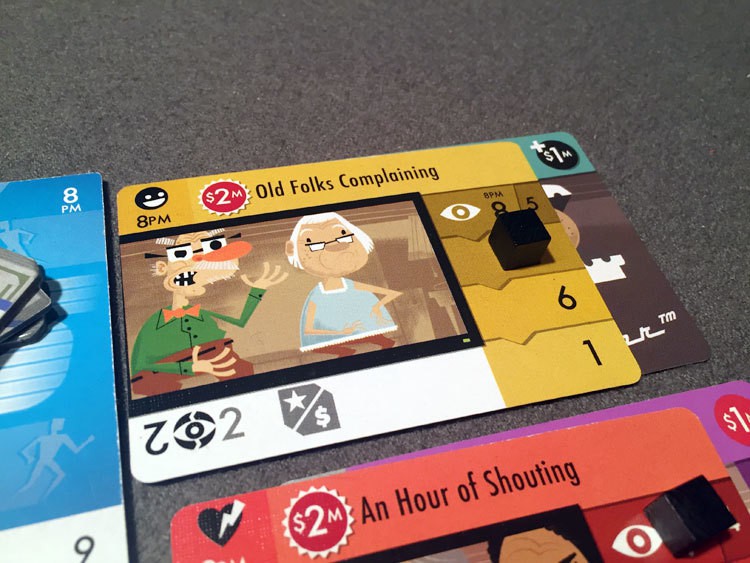
During your turn, you can do one of the following:
- Sign a Star – Take a Star card, pay its cost and place it in your green room.
- Sell Advertising – Take an Ad card, COLLECT money for the Ad, and place it in your green room.
- Develop a show – Take a Show card, pay its cost and attach the required Star(s) and/or Advertisement(s) to the show from your green room and pick the time slot (8, 9 or 10 PM) that the show will air. If there is an existing show, it is moved to your rerun stack and attached Stars and Ads are discarded.
- Note: shows get a bonus for being assigned to their preferred time slot.
- Take a Network Card – These are action cards that provide a variety of bonuses for the player.
- Attach a Star or Ad – This action is used to replace a star or ad that is not effective as one currently attached to a show or if there are optional slots that were not filled when you developed the show
- Drop and Budget (Pass) – When you do this, you gain money (in the 1st season) or the choice between money and points (seasons two through five), receiving more money or points if you are the first to pass.
Each season a player does one of these actions; the player to the left does their action, repeating until everyone has passed.
End of season actions are then performed, consisting of: Checking income, scoring shows and reruns, aging shows, and setting up for the next season.
After five seasons and end game scoring, the player with the most viewers is the winner.
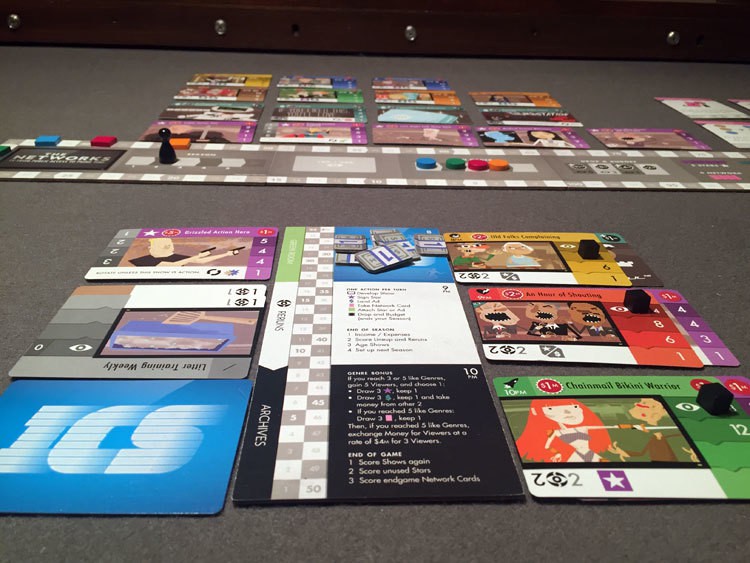
Game Experience:
The Networks is a great card drafting game. It includes several characteristics that I enjoy in a game.
First, the decisions can be difficult. Balancing developing a show with the stars/ads you currently have versus drafting better stars/ads and hoping that the show you want to develop is still available can be fun. Well, it is fun when the show is still there…it is INFURIATING when your opponent develops that show right before your next turn!
There is also the point/money balancing act that is also required. Higher scoring shows and actors require upkeep at the end of each season. If you do not have enough money to pay the upkeep, you will end up losing points. Sometimes you will have to pass up a card you really want because you cannot afford it.
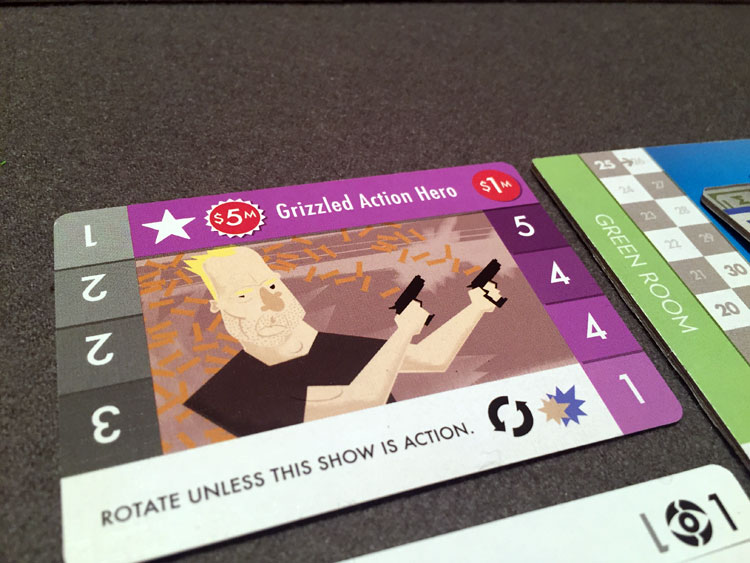
There are also Network Cards need to be considered. These will be drafted instead of an actor/ad or developing a show. These cards provide one of four bonuses: immediate upon drafting, a one-time use whenever the player wants, end of game scoring or, in the advanced game, a lasting effect that includes a bonus power if it is discarded.
Second, I REALLY enjoyed managing the shows. When you develop a show, you need to decide which stars and/or ads to attach; however, some shows require a star and/or ad to be in your green room before you can even draft the show to develop. You also have to decide which time slot to air the show because some shows get a bonus if placed in a specific time slot. It is not an easy decision because whatever show is already in that time slot will be relegated to reruns. The discarded show will score its rerun value one time at the end of the current season and then be held in your archives for the rest of the game.
It is not that simple though because each show earns a different number of viewers based on how many seasons it has been on the air. Some score a lot of points in the first year while others actually increase in year two. So timing when you remove a show has to be considered when developing a new show.
In addition, some ads and stars earn more if they are attached to shows with the appropriate genre or time slot. This is another layer to managing your show that needs to be considered.
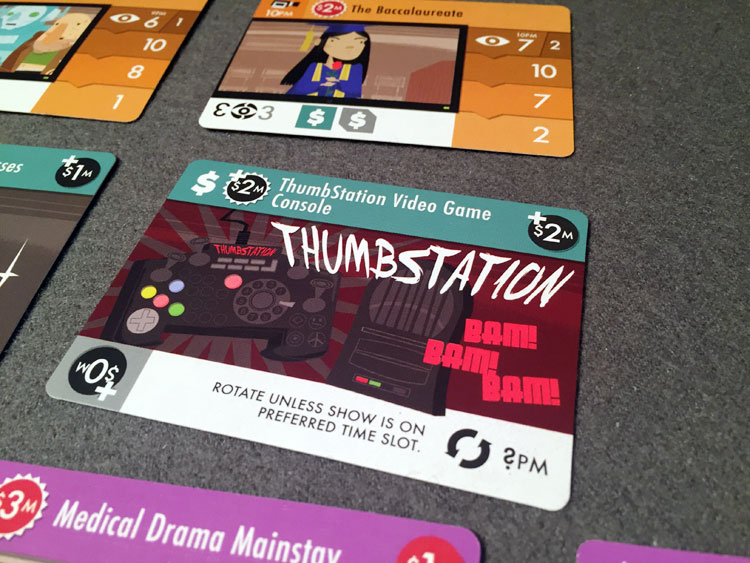
You will also get a one-time bonus when you have aired shows in the same genre. At three of the same genre, you will get a free star or a free ad and money; whereas at five you will get a free network card and the opportunity to exchange money for points. Both of these bonuses can be very helpful. For example, if you are short money, it may benefit you to air a less than optimal show to hit your three genre bonus so that you can generate money for your next turn. It will save you an action and may allow you to draft the card you need before your opponents.
Third, the game is, in my opinion, legitimately funny. We had many LOL moments. The names of the shows are based on actual TV shows, but are usually really bad puns. For example, Monday Night Foosball, American Samurai Worrier, and North Lawn are shows you can air. The stars are based on actor stereotypes, like Always Dies in Everything or Cult Sci-Fi Actor, whereas Ads are a mix of pop culture and advertising mockery. Combined, we found these shows to be funny and almost create their own stories you can make up while adding the show to your line up. I mean, who wouldn’t watch “Found,” starring “That Weird-Looking Star” and “Creepy Vampire,” which is brought to you by “Hairy Hamburgers?”
That being said, having broad pop culture TV knowledge will be necessary to understand many of these jokes, so your humor value mileage will vary.
Finally, the game feels thematic and presents a unique theme that I have not played before: creating your own TV network. Trying to put the best show together and airing it during best time slot is an entertaining juggling act. Of course it is a game, but it feels like you are putting a network together instead of simply doing action A to get to item B to get victory points.
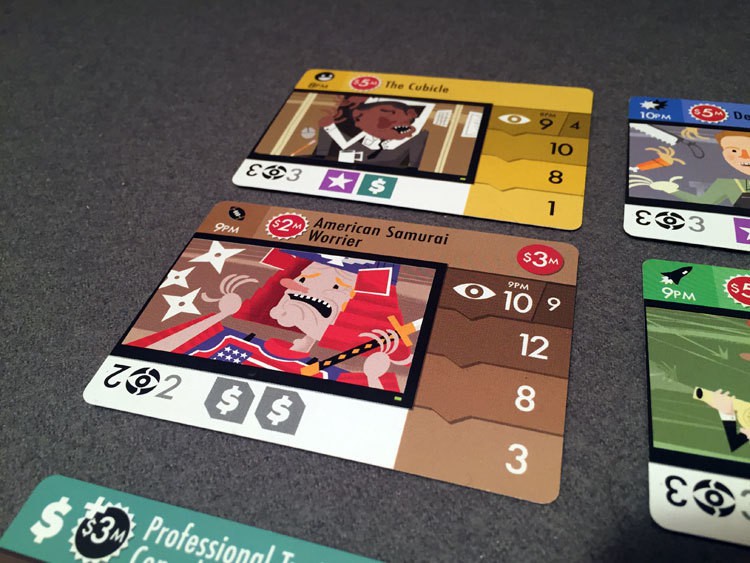
Like all games, not everything is perfect. There are a couple of minor issues I had with the game.
The Network cards can be swingy. They are open to everyone via the draft, and many are situational, but some of the cards can significantly impact scoring while others do not. This did not really bother me, but I know this will impact the fun for some gamers.
The game also offers 12 interactive Network cards. These cards are straight up mean. In a game where drafting can be frustrating when you do not get what you need, we felt this additional element was not needed. Luckily, every Interactive card is marked, so it is easy enough not to include them in your game.
Finally, the number of shows offered is limited. In fact, for balance reasons, in games with less than four players, the Drama genre is not included in the game. It does not really impact the game, but the shows repeat WAY more often than the ads and the actors.
Final thoughts:
I loved The Networks! As I have stated in previous reviews, my free time is considerably less than it used to be. I am always on the lookout for a game that plays in an hour and a half or less, but has interesting decisions. The Networks definitely meets this criterion.
I highly recommend this game for gamers that like drafting games with fun decisions. I would also recommend this game for gamers who have little to no and that plays fast.
If you’d like to get a copy of The Networks, the first print run is currently sold out, but it’s due back in stores in February of 2017.
Final Score: 4.5 Stars – A great card drafting game that takes a unique theme and injects a whole lot of creativity.
 Hits:
Hits:
• Planning your programming is very fun
• The drafting has many difficult choices but not in a frustrating way
• The game plays fast and is easy to teach
• The game is uniquely thematic
• One of those rare games that tries to be humorous and succeeds
Misses:
• Limited number of TV shows, especially in comparison to the number of actors and ads
• Minor color printing issues with some cards and (maybe?) the scoring boards







